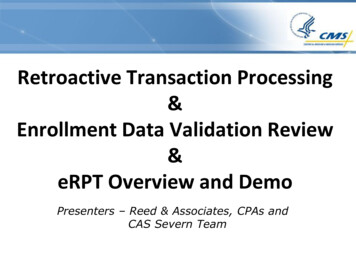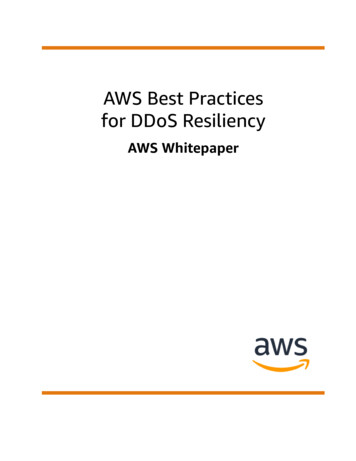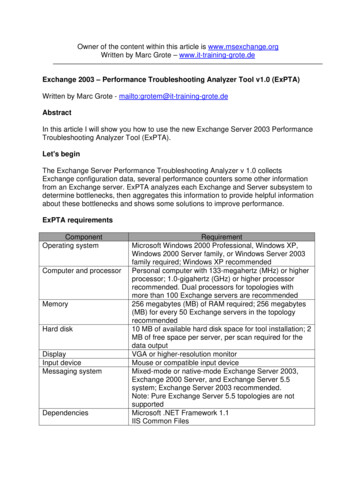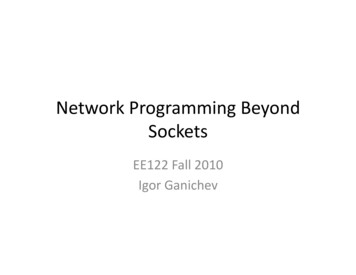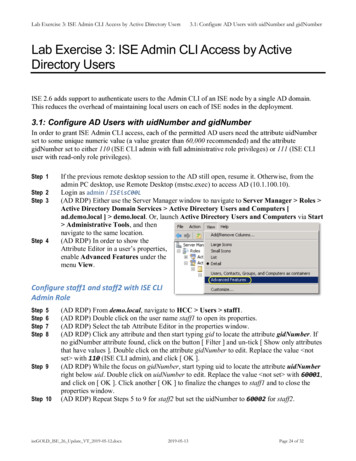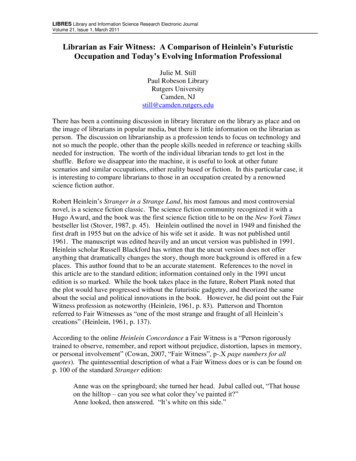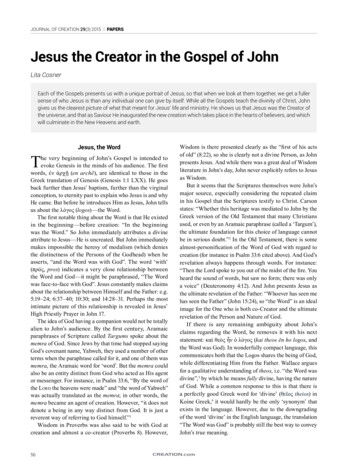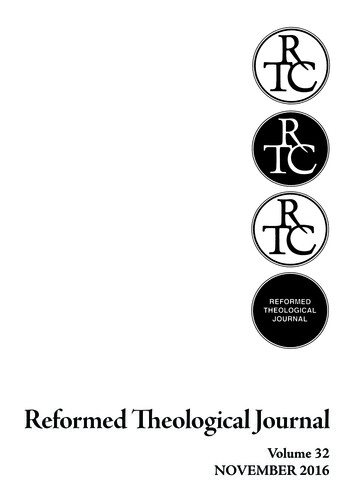
Transcription
Reformed eological JournalVolume 32NOVEMBER 2016
REFORMED THEOLOGICAL JOURNALEdited for the faculty of theREFORMED THEOLOGICAL COLLEGERev. Professor R.L.W. McCollum, B.Agr., M.Th.Rev. Professor W.D.J. McKay, B.A., B.D., M.Th., Ph.D.Rev. Professor W. Peel, B.A., M.Th.Rev. Professor W.N.S. Wilson, M.A., M.Th., Ph.D.Rev. C.K. Hyndman, B.A.Rev. A.N. Kerr, M.B., B.D., M.Th.Rev. E. Donnelly, B.A., M.Th., D.D., Professor EmeritusByEDWARD DONNELLYKNOX HYNDMANDAVID McKAYEditorial address:Articles, books for review and correspondence should be sent to the Reformed TheologicalJournal, 37 Old Holywood Road, Belfast, BT4 2HJ, Northern Ireland. E-mail address:rtj@rpc.orgFrom 2016 the Journal will be produced only in digital format which is available free ofcharge in multiple formats (PDF, Epub, etc) athttp://rtj.rpc.orgThe Reformed Theological Journal is stored on microfilm at Widener Library, HarvardDivinity School, U.S.A., and is available for purposes of research.ISSN 0268 – 4772
REFORMED THEOLOGICALJOURNALREFORMED THEOLOGICAL COLLEGEFOUNDED 1854Theological Seminary of the Reformed Presbyterian Church of Ireland37 Knockbracken Road, Belfast, Northern Ireland, BT8 6SEVol. 32 Reformed Theological JournalNOVEMBER 2016
CONTENTSINFANT BAPTISM AS A MEANS OF GRACEby Robert L. W. McCollum.PREPARING TO PREACH ISAIAHby Andrew Kerr.REPLACEMENT THEOLOGY?.NOT REFORMED AND NOT SAFE:A SUMMARY CRITIQUE OF PAEDOCOMMUNIONby William M. Schweitzer.JEREMIAH BURROUGHSON THE INFINITE EXCELLENCY OF GODby Jim Davison.111253750BOOK REVIEWSScott M. ManetschCALVIN’S COMPANY OF PASTORS:PASTORAL CARE AND THE EMERGING REFORMED CHURCH, 1536-1609by Robert McCollum.Donald John MacLeanJAMES DURHAM (1622-1658) AND THE GOSPEL OFFER IN ITSSEVENTEENTH-CENTURY CONTEXTby David McKay.Sinclair B. Ferguson and Derek W. H. ThomasICHTHUS. JESUS CHRIST, GOD’S SON, THE SAVIOURby Knox Hyndman.Vern PoythressTHE MIRACLES OF JESUS. HOW THE SAVIOR’S MIGHTY ACTSSERVE AS SIGNS OF REDEMPTIONby Warren Peel.62636566
BOOK NOTICES by David McKayJohannes Cocceius, translated by Casey Carmichael, introduced by Willem J. van AsseltTHE DOCTRINE OF THE COVENANT AND TESTAMENT OF GOD . . . . . . . . . . . .Karin Spiecker StetinaTHE FATHERHOOD OF GOD IN JOHN CALVIN’S THOUGHT . . . . . . . . . . . . . . . . .Kelly M. Kapic (Ed.)SANCTIFICATION.EXPLORATIONS IN THEOLOGY AND PRACTICE . . . . . . . . . . . . . . . . . . . . . . . . . . .Dallas M. Roarke, edited by Bob E. PattersonDIETRICH BONHOEFFER.MAKERS OF THE MODERN THEOLOGICAL MIND . . . . . . . . . . . . . . . . . . . . . . . . .David L Mueller, edited by Bob E. PattersonKARL BARTH.MAKERS OF THE MODERN THEOLOGICAL MIND . . . . . . . . . . . . . . . . . . . . . . . . .J. Edward Humphrey, edited by Bob E. PattersonEMIL BRUNNER.MAKERS OF THE MODERN THEOLOGICAL MIND . . . . . . . . . . . . . . . . . . . . . . . . .Gerald BrayTHE CHURCH.A THEOLOGICAL AND HISTORICAL ACCOUNT . . . . . . . . . . . . . . . . . . . . . . . . . . .Oliver D. CrispJONATHAN EDWARDS AMONG THE THEOLOGIANS . . . . . . . . . . . . . . . . . . . . . . .John D. CurridECCLESIASTES. A QUEST FOR MEANING? . . . . . . . . . . . . . . . . . . . . . . . . . . . . . . .Terry L. Johnson1, 2, 3 JOHN. A MENTOR EXPOSITORY COMMENTARY . . . . . . . . . . . . . . . . . . . . .Chris GreenCUTTING TO THE HEART.APPLYING THE BIBLE IN TEACHING AND PREACHING . . . . . . . . . . . . . . . . . . . .Robin Lane FoxAUGUSTINE. CONVERSIONS AND CONFESSIONS . . . . . . . . . . . . . . . . . . . . . . . . .686869696969707071717172
Reformed Theological Journal 2016 - Volume 321INFANT BAPTISM AS A MEANS OF GRACERobert L. W. McCollumRobert McCollum is Professor of Pastoral Theology and Homiletics in the Reformed TheologicalCollege, Belfast, and minister of Lisburn Reformed Presbyterian Church.Every subject that we think about, every topic that we discuss or every theme that we examine mustbe considered with reference to God - God the Father, God the Son and God the Holy Spirit. God theFather is the fountain of all knowledge and understanding. In Jesus Christ “are hidden all the treasuresof wisdom and knowledge” (Colossians 2:3) and it is God the Holy Spirit who guides “into all truth”(John 16:13) through the Scriptures which he has given. This means that we will consider the topic“Infant Baptism as a means of Grace” with reference to God and particularly through the Word ofGod.Baptism is one of the two Sacraments that Christ instituted for his Church; the other one being theLord’s Supper. The Westminster Confession of Faith defines sacraments as follows:Sacraments are holy signs and seals of the covenant of grace, immediately institutedby God, to represent Christ and his benefits, and to confirm our interest in him; as alsoto put a visible difference between those that belong unto the church and the rest of theworld; and solemnly to engage them to the service of God in Christ, according to hisword1Sacraments are signs and seals of the Covenant of Grace. That invites the question: What is theCovenant of Grace? As it was determined in the counsels of eternity between God the Father, Godthe Son and God the Holy Spirit, it is usually designated the Covenant of Redemption. On the otherhand, as it applies to the elect, those whom God has purposed to save from all eternity, it is known asthe Covenant of Grace. The comment by W. G. T. Shedd in relation to this differentiation is helpful:The Covenant of Grace and that of Redemption are two modes or phases of the oneevangelical covenant of mercy2This eternal Covenant of Grace entered time when God addressed the serpent (Satan) after the rebellionof Adam and Eve. “I will put enmity between you and the woman, and between your offspring andher offspring; he shall bruise your head, and you shall bruise his heel.” (Genesis 3:15) The blessingsof the Covenant would come through a Mediator - the seed of the woman, Jesus Christ.The remainder of Scripture is the unveiling of this Covenant - the first part of the Bible (the OldTestament) being the administration of the Covenant prior to the Incarnation, prior to the coming ofChrist; the second part of the Bible (the New Testament) being the administration of the same Covenantafter Christ’s coming.God very specifically established the Covenant with Abraham. The details are recorded in Genesis12:1-9. Genesis 17:1-14 informs us that the Covenant was established, not with Abraham alone, butalso with his offspring, in descending lines of generations. “And I will establish my covenant betweenme and you and your offspring after you throughout their generations for an everlasting covenant, tobe God to you and to your offspring after you.” (Genesis 17:7).12Westminster Confession of Faith, ch. 27, para. 1W.G.T. Shedd, Dogmatic Theology, 1889-94 ed., (Nashville 1980), 2.360
Reformed Theological Journal 2016 - Volume 322With respect to this gracious Covenant that God established with undeserving Abraham and hisoffspring, he decided to give to him a sign. This sign would be a visible pledge of his covenantfaithfulness. That visible sign was circumcision. “You shall be circumcised in the flesh of yourforeskins, and it shall be a sign of the covenant between me and you. He who is eight days old amongyou shall be circumcised.” (Genesis 17:11, 12a).God gave to his people another sign of his covenant faithfulness, prior to the coming of Christ. It wasthe Passover. To his people, about to leave Egypt, God said through Moses, “You shall observe thisrite as a statue for you and for your sons forever. And when you come to the land that the LORD willgive you, as he has promised, you shall keep this service.” (Exodus 12:24, 25).Down through the centuries these signs of God’s covenant faithfulness were observed by the Jews.Therefore, when we come to the ‘Incarnation’ we are simply informed about the child born to Maryand Joseph, “.at the end of eight days he was circumcised.” (Luke 2:21).And the annual Passover feast was something that still was being observed in the first century. Jesusexperienced this for himself at twelve years of age. “Now his parents went to Jerusalem every yearat the Feast of the Passover. And when he was twelve years old, they went up according to custom”(Luke 2:41, 42).Both these Old Testament signs of God’s covenant faithfulness involved the shedding of blood. WhenChrist’s blood was shed, once for all, to redeem his people, to procure their salvation, the bloody signsneeded to be changed into bloodless equivalents for the New Covenant era. The Passover was replacedby the Lord’s Supper on the evening of the crucifixion by Jesus in the Upper Room (Luke 22:14-23).Circumcision was replaced by baptism, prior to our Lord’s Ascension, when he commissioned hisdisciples, “Go therefore and make disciples of all nations, baptizing them in the name of the Fatherand of the Son and of the Holy Spirit, teaching them to observe all that I have commanded you. Andbehold I am with you always, to the end of the age.” (Matthew 28:19, 20).The disciples responded to that commission. Their mission began on the day of Pentecost, with Peterpreaching the gospel, concluding with the challenge, “.Repent and be baptised every one of you inthe name of Jesus Christ for the forgiveness of your sins, and you will receive the gift of the HolySpirit. For the promise is for you and for your children and for all who are far off, everyone whomthe Lord our God calls to himself.” (Acts 2:38, 39). Those devout Jews, assembled in Jerusalem forthe feast of Pentecost from all over Asia Minor and the Eastern Mediterranean, would have recognisedimmediately the covenant formula that Peter used in his concluding remarks. It was essentially thesame as was given by God to their ancestor Abraham 2000 years earlier. To Abraham God had said,“And I will establish my covenant between me and you and your offspring after you.” Through PeterGod the Holy Spirit said, “For the promise is for you and for your children and for all who are far off,everyone whom the Lord our God calls to himself.”The Lord’s Supper being the New Covenant equivalent of the Passover is beyond dispute. It issomething that finds universal acceptance in the Christian church. That baptism is the New Covenantequivalent of circumcision is disputed by some. However, when we recognise that there is one God,and one eternal Covenant of Grace, with one way of salvation throughout history, through faith inJesus Christ, then the evidence is compelling that baptism is the fulfilment of circumcision. Colossians2:12, 13 places the matter beyond dispute when Paul uses the two terms interchangeably. “In himalso you were circumcised with a circumcision made without hands, by putting off the body of theflesh, by the circumcision of Christ, having been buried with him in baptism, in which you were alsoraised with him through faith in the powerful working of God, who raised him from the dead.”
Reformed Theological Journal 2016 - Volume 323I have taken time to lay this foundation because I want us to see that there are parallels between baptismas a means of grace and circumcision as a means of grace.It is also important that we understand the terms of the subject before us. The Westminster Confessionof Faith defines baptism as follows:Baptism is a sacrament of the New Testament, ordained by Jesus Christ, not only forthe solemn admission of the party baptised into the visible church, but also to be untohim a sign and seal of the covenant of grace, of his ingrafting into Christ, ofregeneration, of remission of sins, and of his giving up unto God through Jesus Christ,to walk in newness of life: which sacrament is, by Christ’s own appointment, to becontinued in his church until the end of the world.3Hodge in his commentary on the Confession reduces this definition to three propositions.aBaptism is a sacrament of the New Testament, instituted immediately by Christ, and by hisauthority to continue in the Church until the end of the world.bAs to the action which constitutes baptism, it is a washing of the subject with water (the mannerof the washing not being essential), in the name of the Father, and of the Son, and of the HolyGhost, by a lawfully ordained minister.cIt is done with the design and effect of signifying and sealing our ingrafting into Christ, ourpartaking of the benefits of his covenant, and our engagement to be his.”4As we are principally considering in this article “Infant Baptism as a means of Grace”, what do weunderstand by “means of grace”?The eternal God we know, love and worship is the God who uses “means” to accomplish his eternalpurpose. He is not limited to “means” but often for his own glory this is how he operates. For example,when an elderly person becomes partially sighted through cataracts God will use a simple operationby an eye surgeon to restore perfect vision. In the same way God often chooses to use means tocommunicate his grace to those who are dead in trespasses and sins.The Westminster Shorter Catechism helpfully addresses the subject of means. The question is asked:“What are the outward means whereby Christ communicateth to us the benefits of redemption?” (Q88).The answer is, “The outward and ordinary means whereby Christ communicateth to us the benefits ofRedemption, are his ordinances; especially the Word, Sacraments, and Prayer; all which are madeeffectual to the elect for salvation.”Roderick Lawson comments:In order that we may be saved, God demands of us not only faith and repentance, butthe diligent use of the outward means of grace as well. These outward means are herecalled ordinances, or things which God has ordained. They consist mainly in - 1 Thestudy of the Bible; 2 The observance of the Sacraments; 3 The use of Prayer.5Baptism is one of the two sacraments. How or in what way does it become a means of grace?Westminster Confession of Faith, ch. 28, para. 1A. A. Hodge, The Confession of Faith: A Handbook of Christian Doctrine Expounding The Westminster Confession,(Edinburgh, 1958), p.338, 339.5Roderick Lawson, The Shorter Catechism, with Scripture Proofs and Comments, Comment on Question and Answer88, p.51.34
Reformed Theological Journal 2016 - Volume 324First of all we eliminate the view held by Roman Catholicism that the sacrament of baptism in and ofitself always communicates grace at the time of being administered (ex opere operato). Rome teachesand believes that, at the moment a child is baptised, it is then and there regenerate. The child is thenand there born again. This is known as “sacerdotalism”.G. I. Williamson helpfully compares the sacerdotal view of the sacraments with the Reformed view:The sacerdotal view is that the saving grace of God is contained in the sacraments andconveyed by their administration. The Reformed view is that God the Holy Ghost workswhen, where, and how he will in conferring saving grace, and that the sacraments aredependent upon and subordinate to his sovereign operation. It is because he is pleasedto use the sacraments to exhibit and to confer grace that they become efficacious6I emphasise Williamson’s statement “that the sacraments are dependent upon and subordinate to hissovereign operation”. Everything that I say in this article recognises this as a foundational principle.God is sovereign in whatever means he determines to use and when he makes that means effective.1. Baptism itself as a means of graceCan we say that the sacrament of baptism is a means of grace at the moment of baptism for the childbaptised? The answer to that question is “no”, if we are thinking that the baptism of a childautomatically or magically communicates the blessing that it signifies - regeneration and union withChrist.Edmund P. Clowney writing on this subject comments:The sacraments are not sacred magic, the elements themselves containing the blessing,as if the Holy Spirit could be dispensed from a font, or Christ contained in a cup. Goddoes not surrender his work of grace to external symbols, controlled by the manipulationof men.7I agree entirely with Clowney. But does this mean that the sacrament of baptism, at the time of beingadministered, is not a means of grace to the child being baptised in any sense? It would be wrong, Ibelieve, to come to that conclusion.Christ has appointed the sacrament of baptism for believers and their children. It would beunreasonable therefore to conclude that there was no blessing, of any description, on the child at thebaptismal service. While the child will have no conscious awareness of his baptism, yet I do believethat Christ, in the exercise of his sovereignty, will communicate a blessing upon the child.Such a conclusion is not based on sentiment. The sacraments, as the Reformed Confessions teach us,are a means of grace to all who participate in them. The infant child of Christian parents being baptisedshould not be considered an exception. But is faith not essential to the receiving of such blessing?John Calvin, in a comment made on Isaiah 58 has written:We maintain, therefore that there is a direct relationship between faith and thesacraments; they become effective through faith.8G. I. Williamson, The Confession of Faith for Study Classes, (Philadelphia, 1965), p.203Edmund P. Clowney, Contours of Christian Theology, The Church, (Leicester, 1997), p.274, 2758John Calvin, Commentary on Isaiah 58, quoted by Joel Beeke, 365 Days with Calvin, (Leominster, 2008), 10th May67
Reformed Theological Journal 2016 - Volume 325Although it is impossible for the infant being baptised to exercise faith, the parents are expressingtheir faith in presenting their child for Christian baptism. They are in effect saying, “in the CovenantGod has promised to be God to us and he is, through Jesus Christ our Saviour; but he has also promisedto be God to our children after us. We therefore present our child for baptism and in so doing, byfaith, lay claim to that covenant promise.”Some will maintain that a little child, a few weeks old, is incapable of receiving blessing. The answerto such an objection is found in Mark 10:13-16. Parents were bringing their infants to Jesus so that“he might lay his hands on them and pray.” The disciples of Jesus thought that such a thing wasridiculous and rebuked these parents. Jesus was indignant with his disciples. To the parents he gavethe following words of encouragement,“Let the children come to me; do not hinder them, for to such belongs the kingdom ofGod. Truly, I say to you, whoever does not receive the kingdom of God like a childshall not enter it.” And he took them in his arms and blessed them, laying his handson them. (Mark 10:14b-16).There are two things to note about these words of Jesus. Firstly he blessed these infants; so infantchildren are capable of receiving blessing from the God of all grace and mercy. Secondly, he revealedthat children of such a tender age can be regenerate. He said, “Let the children come to me; do nothinder them, for to such belongs the kingdom of God.”With respect to this incident and the prayer offered for these children Calvin writes,.what other prayer did he utter for them than that they should be received into thenumber of the children of God? It follows then that they were regenerated by the Spiritin the hope of salvation . they were partakers of the spiritual gifts represented bybaptism.9Matthew Henry makes a similar comment.The strongest believer lives not so much by apprehending Christ as by beingapprehended by Christ and this the least child is incapable of doing. If they cannotstretch out their hands to him; yet he can lay his hands on them and so make them hisown and own them for his own10Recently when preaching at a baptismal service from Mark 10:13-16 I drew particular attention tothose words at the end of verse 14, “.to such belongs the kingdom of God.” From this statement Imade the point that there are no limits on the work of the Spirit in regeneration. God is sovereign. Achild may be born again (regenerate) in his mother’s womb as we believe Jeremiah was (Jeremiah1:5) and as we believe John the Baptist was (Luke 1:44) every bit as much as a boy of sixteen, or awoman of seventy. The Holy Spirit is sovereign in his operations, as we read in John 3:8. In relationto the baptism of a child of believing parents we can draw the conclusion that what was signified inbaptism, regeneration and union with Christ, can take place before baptism, at baptism or after baptism.2. Baptism is a means of grace to covenant children through the faithfulness of parents to theirvowsPrior to the baptism of a child parents in most Reformed denominations take vows. I will illustrate9John Calvin, A Harmony of the Gospels, (Edinburgh, 1972), Vol.2, p.171Matthew Henry, One Volume Commentary,on Matthew 19:13-15, p.171110
Reformed Theological Journal 2016 - Volume 326from the vows taken by parents in the Reformed Presbyterian Church of Ireland. There is a vow thatcalls on the parents to be faithful to their parental obligations.11 It is four-fold in nature. The firstobligation relates to prayer.a) Parents make a commitment to pray for their childThey promise: “To pray that your child may be renewed and brought to a saving knowledge of JesusChrist as signified in this sacrament”.While parents will take this promise at the baptismal service they will already have prayed this prayerfrom the moment they knew a child was conceived in the womb. They will have prayed this prayerin the days leading up to the baptismal service. And they will pray it many days after the service,maybe for years, until they see evidences of grace in the life of their child.They will pray on the basis of the Covenant of Grace. Their prayer will be worded something likethis: “Lord you are our God, be a God to our little boy, save him by your grace, for you have promisednot only to be a God to us but to our children after us.” An essential aspect of prayer is laying claimto the promises of God.We have an example of such persistent prayers being offered by the father of the famous missionaryto the New Hebrides, John G. Paton. He writes in his autobiography about a little room in his familyhome:Thither daily, and oftentimes a day,.we saw our father retire, and shut the door; andwe children got to understand by a sort of spiritual instinct (for the thing was too sacredto be talked about) that prayers were being poured out there for us, as of old by the HighPriest within the veil in the Most Holy Place.12b) Parents make a commitment to teach God’s Word to their childThey promise: “to seek that your child may come to know the Holy Scriptures and to know the dutyof committing himself/herself to God”.Covenant children will be taught God’s Word at church services and through children and youthministries in the church. Their most effective teachers, however, will be the parents. By taking asolemn vow at the baptism of their infant children, to teach them God’s Word, they are placed undera sacred obligation to fulfil that vow (Deuteronomy 6:4-9; Ephesians 6:4). “A religious vow orcovenant does not bind us to anything additional to God’s Word but additionally binds us to that whichis already our duty to do.” (Wm Symington).Children are to be taught by their parents in both formal and informal situations. Deuteronomy 6:6,7 commands parents that they are to seize every opportunity, through the day, to teach their childrenabout God and his wonderful works. “And these words that I command you today shall be on yourheart. You shall teach them diligently to your children, and shall talk of them when you sit in yourhouse, and when you walk by the way, and when you lie down, and when you rise.”This command is reinforced by the apostle Paul in Ephesians 6:4. Parents will delegate some of thisresponsibility to the church through the teaching ministry of the congregation to which they belong.This will be of immense benefit and support. Children, however, who are taught God’s Word primarilyfrom their parents enjoy an immense privilege. With God’s blessing it will bring forth much fruit.Paul writing to the Christians in Rome states, “So faith comes from hearing, and hearing through theword of Christ.” (Romans 10:17).1112The Code, The Book of Government and Order of the Reformed Presbyterian Church of Ireland, ch. 9, para. 9.05J. G. Paton, Missionary to The New Hebrides, p.8
Reformed Theological Journal 2016 - Volume 327c) Parents make a commitment to be faithful in their Christian life and worshipThey promise: “to rule well your household, exercising parental authority with firmness andlove, setting the example of a holy and consistent life, and attending with regularity to personal,family and public worship”.Parents who are consistent in responding faithfully to this vow will be the means of much blessing totheir children. Parents promise in this vow to set “the example of a holy and consistent life”. Asministers must practise what they preach, if they are to have an effective ministry, so parents mustconscientiously model the truth of God before their children. Parents who habitually disregard God’sclear, specific commands are not keeping their covenant with God. Such parents cannot expect theirchildren to respond in faith to the promises of God offered to them at baptism. Psalm 103 emphasisesto parents the importance of keeping the covenant: “But the steadfast love of the Lord is fromeverlasting to everlasting on those who fear him, and his righteousness to children’s children, to thosewho keep his covenant and remember to do his commandments”. (Psalm 103:17, 18).Daily family worship will train covenant children from infancy to reach out to God in faith. In thatdaily context they will be brought face to face with the reality of God and the gospel of his grace. Notonly will that be true but the faith of their parents will be a challenge, and a stimulus to faith, ascovenant children grow up in a world of unbelief. By being included in all aspects of family worshipthey will experience what it means to be part of God’s covenant community in the context of thefamily.Children who experience daily family worship will also integrate better and benefit more quickly frompublic worship than children devoid of this experience. Each day covenant children experience “littlechurch”. Then once a week there will be a degree of excitement in meeting with other families in“big church”.As well as taking these three vows parents take a fourth vow which relates to Reformed Presbyteriandistinctive principles and Covenanter history. Baptism is therefore a means of grace through thefaithfulness of parents to their vows at the baptism of their children.The initial promises with respect to children in the Covenant of Grace were given to Abraham andGod knew that Abraham as a conscientious parent would be faithful to his parental obligations. “ForI have chosen him, that he may command his children and his household after him to keep the way ofthe Lord by doing righteousness and justice, so that the Lord may bring to Abraham what he haspromised.” (Genesis 18:19). The sign of God’s Covenant Promise had been revealed to Abraham.God would use Abraham as the means by which that promise would be fulfilled.It is important that parents bring up their children believing that God will use the means he has chosento bring covenant children to himself in saving faith. Rev. William Still, a Scottish minister, in asermon he preached to his Aberdeen congregation in 1968, challenged the parents:I have said this before: too many Christian parents bring up their children in fear lestthey will go astray, rather than in faith that they will not. That fear, expressed in thecourse of their first few years in a thousand ways, soon communicates itself to theirsensitive souls and they become like you, preoccupied with thoughts of going astray.It is like the horrible, drawing power of a precipice. The likeliest thing in the world isthat children brought up in a home where it is feared they will go astray, will go astray.They are predisposed and preconditioned to that possibility for fear comes from Satan,
Reformed Theological Journal 2016 - Volume 328and by fearing where you ought to trust and quietly implement that trust by the worksof faith you are bringing Satan into your home. Whenever fear tends to grip you as itmay (Satan is always up to his tricks), turn at once to God and away from Satan andsay, “God, you have said and you have commanded me to say back to You what Youhave said to me; that these children are Yours. I will not fear, but will believe and actaccordingly”.13Some Christians can be heard to say, “It’s an awful world in which to bring up children.” SuchChristians need to be reminded that it has always been an awful world. It is a fallen world. But God’speople have the assurance that their children are separated unto God - because they are the childrenof God’s children. That truth is recognised in their baptism. Parents should rear their children in faith,rather than in fear; in the faith that God will early in life fulfil what was signified in their child’sbaptism; that God will regenerate them and unite them to Jesus Christ. In practice Christian parentsshould communicate that they trust their children when they are outside their direct supervision. Forexample, when a six year old is going to a birthday party of one of her school friends, the parent asthe child leaves the home should say, “enjoy yourself” rather than “behave yourself”. This indicatestrust rather than suspicion. This attitude should continue throughout childhood and adolescence.Because baptism carries w
The remainder of Scripture is the unveiling of this Covenant - the first part of the Bible (the Old Testament) being the administration of the Covenant prior to the Incarnation, prior to the coming of Christ; the second part of the Bible (the New Testament) being the administration of the same Covenant after Christ's coming.
